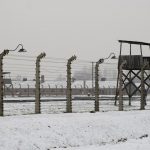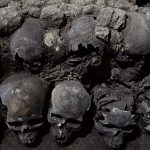
The world’s first cold-weather body decomposition farm to be built at Northern Michigan University
Saturday, May 13, 2017 by Frances Bloomfield
http://www.depopulation.news/2017-05-13-northern-michigan-university-to-debut-a-dead-body-farm-in-effort-to-understand-how-cold-weather-affects-decomposition.html

As part of their new forensic anthropology major, Northern Michigan University (NMU) have included a cold-weather body farm in the curriculum. The body farm is set to be built on 2.5 acres of state land donated by Michigan Governor Rick Snyder. The facility will be the ninth research center in the world to study how the environment impacts the decomposition process of human bodies. However, the NMU body farm is also poised to become the first one devoted to analyzing the effects cooler temperatures may have on a human corpse.
The school has issued a statement about the up-and-coming research facility: “Relatively little information exists on the effects of freezing and thawing on human decomposition. NMU students and faculty will conduct this pioneering research in varying conditions and scenarios, creating the baseline data so critical to the quickly advancing field of forensic anthropology.”
Alan McEvoy, Head of the Anthropology Department at NMU, told MichiganRadio.org that the body farm was an “opportunity”, elaborating with: “This is an opportunity not only for students, it’s an opportunity for law enforcement training, it’s an opportunity for science professionals to come here and do basic research, and get hands-on training.”
Other people have echoed McEvoy’s sentiments. Michael Bath, Public Safety Director at NMU, is one of them, having told UpperMichigansSource.com: “An opportunity like this is just outstanding from a crime scene investigation stand point. We do an evidence type program where we’re going to be able to use actual crime scenes and process those crime scenes.”
When asked about the smell, McEvoy remarked that there wouldn’t be much of an odor unless you were inside the facility while also working on fresh bodies. On how and where the school would be obtaining bodies, McEvoy stated that they would be using “donations” from Michigan residents who wanted to give away their bodies for scientific purposes. He then added that the remains of donors would then be kept in a safe, climate-controlled setting.
Beginning autumn 2017, students will be able to enroll in the classes being offered in NMU’s forensic anthropology program.
What cold weather can do to a body
Unlike warmer temperatures, colder climates leave little room for bacteria and insects to thrive. Without these factors bodies either take longer to decompose or don’t rot at all. Extreme cold can “freeze” cells in place. The bodies of unfortunate climbers littering the slopes of Mount Everest are testaments to the effects of extreme cold. Among those bodies is that of George Mallory, allegedly the first man to reach the summit of Mount Everest. The British explorer and mountaineer disappeared near the summit in 1924, alongside his climbing companion, Andrew Irvine. It wasn’t until 1999 that his body was found in a near-pristine condition at the foot of the Northeast Ridge by American mountaineer Conrad Anker. In the decades before his discovery, his final fate was the subject of wonder and speculation. After Anker’s discovery, he’s since become one of the famous figures on Everest and a reminder of how well the cold can preserve a corpse. (Related: Cryogenics pioneer claims man frozen in liquid nitrogen 50 years ago will be brought back to life)
Bodies that have been preserved this way require specific temperatures and humidity in order to remain intact outside of their original environment. This makes them difficult to work with, as even the slightest change in temperature can bring about fast-acting changes in a body. Just as frustrating is the fact that different cells die at different rates, so while a body may look fine on the outside, the inside will be a completely different story.
Visit MindBodyScience.news to learn more about how the human body works, or to find out how the human body can be affected by all kinds of changes.
Sources Include:
Tagged Under:





